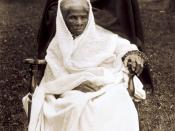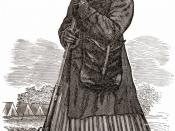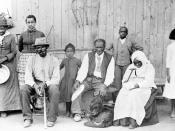Race and Alienation
Harriet Tubman was an extordinary woman, in a way she was known as the Moses of her people. During a ten-year span as an Underground Railroad Conductor, she made 19 trips into the South and escorted over 300 slaves to freedom. And, as she once proudly pointed out to Frederick Douglass, in all of her journeys she "never lost a single passenger." (Tubman) Soon after the outbreak of the Civil War, Harriet Tubman served as a soldier, spy, and a nurse for the Union Army. But for all of her accomplishments she was alienated because she was black. No matter what she did not many people were truly willing to acknowledge her for her deeds, till much later in time. Even at a young age Harriet Tubman had always been willing to stand up for people. When she had been young, Harriet Tubman had blocked a doorway to protect another field hand from an angry overseer.
The overseer picked up and threw a two-pound weight at the field hand. It fell short, striking her on the head. She never fully recovered from the blow, which subjected her to spells in which she would fall into a deep sleep. The event was one moment of alienation, because when the overseer picked up the weight and threw it at the escaping field; he was disregarding Harriet Tubman as a person. Because if he did wouldn't have thrown if he did, as his actions caused an almost irreparable damage to her only increasing the amount of alienation she received. Possibly the worst act of alienation committed against her was when she was denied payment for her wartime service, she was than forced, after a bruising fight, to ride in a baggage car on her return to Auburn N.Y. The...


